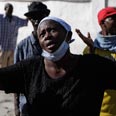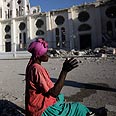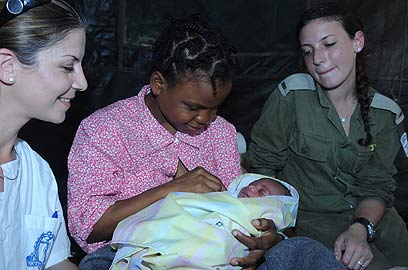

PORT-AU-PRINCE - On a stretcher next to her exhausted father is a beautiful eight-year-old girl whose leg was broken when the earth quaked and their house collapsed. Katyana Delave is in good shape, and her leg is already plastered. Even the pain has been lessened, but she is still very sad.
In a few moments she will be released from the Israeli field hospital that was set up in Port-au-Prince. Her father is also worried. They have nowhere to go.
The Delave family lives on the far side of Haiti, an hour's drive from the hospital. With their house in ruins, Katyana's mother and brothers live in the road, but her father Jean-Baptiste nonetheless wants to go back so that the family can be reunited. "I don't have money to get back," he says in despair.
One of the nurses brings the girl a plastic doll and her eyes light up. She smiles and holds out her hands for the doll, takes off its pink clothes and dresses it again. "I was very scared when the house fell," she says as she hugs the doll.

The first birth in the IDF field hospital, Haiti (Photo: IDF spokesperson)
Her father adds, "The house shook and began to tumble. It was a miracle we got out, but everything around us was in ruins. Everyone went out onto the streets. Those who were able took the corpses out onto the street too."
A few minutes later, the stretcher bearers take Katyana out of the hospital to where those released are waiting for a solution to be found for their homelessness. None of them has a place to go back to. Katyana lies on the stretcher and waits.
"She has a stomach ache," her father explains. "She is very hungry. We have no food or water, and no money. And I have no work." He gazes in despair. He has no idea how he will manage to get back to his family.
Joseph Vitesmith, six, also has no idea where to go. He has a broken leg and is being released from the hospital. One of the nurses has taught him to walk with crutches. He takes a few steps and groans in agony. His elder brother gets some medicine for him. "We don’t know where to go," he says. "Our home is in ruins."
A lone baby looks for a comforting touch
In the early morning hours, local time, a baby arrives at the IDF field hospital. It is about a year old, covered in dust, weak and exhausted. "Guys, quickly now, we need an infusion," calls Lieutenant Colonel Amit Asa, pediatrician and the commander of the air force medical unit. "The baby needs liquids. We need tests. We'll take a blood test and check its temperature."Many hands take care of the anonymous baby. Nobody knows how it survived five days, alone below the rubble, without food or water, without human comfort. "The baby arrived seriously dehydrated, with low blood sugar levels," staff members explain. One nurse stroked its head while others inserted a needle into its vein.
The baby wailed with fear and pain, but the comforting touch of the nurse calmed it. After a few moments, the wails subsided and the baby seemed less troubled, but its eyes were still wide with shock. The baby, it seems, was rescued by residents and brought to the rescuers. No parents or family have been located.
The baby will survive the earthquake, but nobody knows what will happen to it when its condition has stabilized. "So many orphaned children come here," says Dr. Guy Lin, manager of Nahariya's trauma unit, who is coordinating the surgical operations in the field hospital. "We'll keep them here a few days, but after than, where will we send them? To one of the tents in the streets?"
Lin says that on January 21, a US ship is due to anchor off the island, and the staff hopes that a solution for the orphans will be found.
Meanwhile, the emergency unit staff, which is taking care of the baby that seems to have been abandoned, will continue to fight to save its life.















